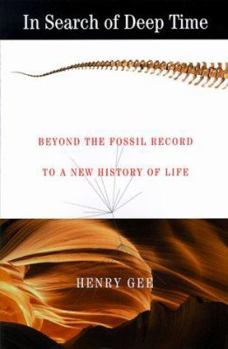In Search of Deep Time: Beyond the Fossil Record to a New History of Life
Select Format
Select Condition 
Book Overview
Cladistics--the science of comparison--is transforming the way paleontologists view evolution. In Search of Deep Time strips away conventional assumptions about the evolution of life to reveal a world... This description may be from another edition of this product.
Format:Hardcover
Language:English
ISBN:068485421X
ISBN13:9780684854212
Release Date:December 1999
Publisher:Free Press
Length:267 Pages
Weight:1.18 lbs.
Dimensions:0.9" x 6.3" x 9.6"
Customer Reviews
5 ratings
What we can learn from fossils
Published by Thriftbooks.com User , 19 years ago
The title of "Deep Time" refers to the immense gulfs of time that separate the major events in evolution. The best known of these is the gap of 65 million years between the disappearance of the dinosaurs and the present, but this only one of many, and by no means the largest. More important than the size of these gaps for Henry Gee's arguments, however, is their emptiness: there are extremely few fossils to provide landmarks, and many of these are damaged, incomplete, and in general unsatisfactory. "Incomplete" is, indeed, a weak word to convey the idea that one worn fragment of a jawbone may be all there is for trying to reconstruct a whole animal. Fossils thus offer nothing that resembles a historical record. Gee considers that trying to reconstruct evolution on the basis of so little information requires far more rigorous methods than those that were in general use before the development of cladistics. Most of his book, therefore, is an attempt to convince readers of the rightness of the cladistic approach, in which the only consideration is the branching of lineages into separate lines of descent. In this scheme it makes sense to classify organisms into clades, where a clade contains only those individuals that are derived from a single ancestral branchpoint. This sounds rather abstract, and in many accounts it is, but Gee does a good job of explaining what he means in a comprehensible way. He is particularly interested in fish, and they illustrate well how the cladistic approach has transformed ideas of how organisms should be classified. According to him, a fish is something you buy in a fish shop, and has no deeper meaning than that. This is because some "fish" are more closely related to mammals than they are to other "fish". As a more familiar example, there is now scarcely any doubt that chimpanzees and gorillas are much more closely related to humans than they are to other apes, orang utans and gibbons. There can be no clade, therefore, than includes all these apes but does not include humans. Although in general Gee's argument is clear and convincing, he oversimplifies when he tries to justify the cladistic method in terms of parsimony -- the guiding principle that the preferred reconstruction of a history is the one that involves the fewest hypothetical events. The problem here is that he says far too little about the rooting of phylogenetic trees. The example that he uses is the set of three individuals that consist of himself and his two cats, and he claims that parsimony requires a classification in which the two cats are more closely related to one another than either of them is to him. This conclusion, however, owes everything to common sense and nothing to parsimony, because in an unrooted tree with only three branches exactly the same number of events are needed to connect the tree individuals regardless of which of the three one thinks is the least closely related. Because cladistics is concerned only with the branchpoint
Pretty Good
Published by Thriftbooks.com User , 24 years ago
This is a good book if for no other reason than its refreshing honesty with respect to paleontology. Gee attempts to pry the facts apart from the evolutionary story telling that plagues this business. On the other hand, he attempts to paint molecular cladistics as a purely objective and scientific alternative. Unfortunately, that is simply not true (not yet at least). Molecular cladistics has problems both in methodology and data (in cases of deep branches). Parsimony analysis (mentioned by Gee), for example, is giving way to other analytical methods precisely because of the problems with parsimony. Furthermore, the conclusions of cladistics are often enough at odds with the paleontology. So the story is not quite so simple. That being said, I still felt that this was a pretty good book
In Search of Deep Time
Published by Thriftbooks.com User , 24 years ago
A must read for anyone interested in the history of life on Earth and evolution research. A fascin-ating, delightful and informative read, highly accessible - the worst moment was three Latin nomenclatures in one sentence. Frequently insightful, occasionally inciteful; an enjoyable sledgehammer tour through the hallowed halls, that turns any number of previously held beliefs on their ears. I've just given it to my conservative christian intelligent design/divine creation advocate debate mate for his reactions. I can't wait. Now on to Rare Earth.
Brilliant, scholarly, witty
Published by Thriftbooks.com User , 24 years ago
Who would have thought that an explication of cladistics could be both fascinating and entertaining? This is not a dumbed-down book; yes, it is written for the intelligent lay person, not the specialist, but Gee doesn't simplify just to get the reader through the book. And guess what? A bird IS a dinosaur!
In praise of cladistics
Published by Thriftbooks.com User , 24 years ago
Henry Gee has produced a very readable book on paleontology and evolution. This is cladistic analysis for beginners, and will interest a wide audience. I read it cover to cover in one day. It will be very interesting to see how paleontology squares off with the genomic sequences that will soon become available. Very well written and enjoyable.





